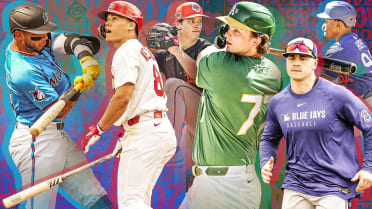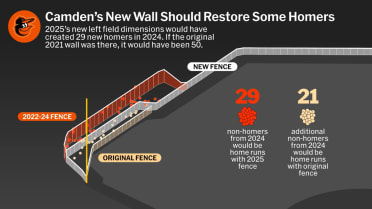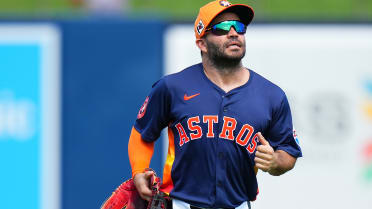Harris' improbable journey to the Nationals
Will Harris never stopped believing in Will Harris. In the end, that’s what this sweet, improbable story is all about. His journey to the three-year, $24-million contract he agreed to with the Nationals this week almost defies explanation.
First, there’s this: The Nationals' bullpen is getting one of baseball’s best relievers in 2019 -- a 1.50 ERA (second-lowest among Major League relievers) and a 0.933 WHIP in 68 regular season appearances.
Never mind that home run he surrendered to Howie Kendrick in Game 7 of the World Series. As one of the Astros front office executives said later, “He put that baseball right where he wanted to put it. Sometimes, that happens.”
Kendrick just happened to bang the perfect pitch off the right-field foul pole to turn a 2-1 Astros lead in the seventh inning into a 3-2 deficit that the Nationals would not surrender. Before Kendrick’s home run, Harris had a 0.93 ERA in 11 postseason appearances in 2019.
Here’s the improbable part: Harris was 31 years old with a career that seemed to be going nowhere when he walked into the Astros clubhouse in the spring of 2015, having been waived by three teams and twice undergoing career-threatening surgeries on his right elbow.
“I'd call my wife [Caroline] before a surgery and say, 'Hey, look, this could be it. We need to prepare,'" Harris said.
The Astros saw him as someone who had been unable to stay healthy and wasn’t relying on his best stuff. They were right. In a breakthrough 2015 season, Harris had a 1.90 ERA in 68 appearances. He followed up that season by making the American League All-Star team in ‘16.
In Harris’ first three seasons with the Astros (2015-17), he pitched in 180 games and was eighth among Major League relievers with a 2.30 ERA and ninth with a 0.97 WHIP.
Then 2018 happened. Harris’ numbers -- a 3.49 ERA in 61 appearances -- weren’t awful. But they were such a step back that he was left off the team’s American League Championship Series roster.
“One of the tougher conversations I’ve had with a player,” Astros manager AJ Hinch said last summer.
Which prompted yet another remake.
“I saw other guys throwing their curveballs in all counts,” Harris said, “and I had enough confidence in mine to do that. I probably should have done it sooner.”
He threw his curveball a career-high 42 percent of the time in 2019 and, combined with a nasty cutter, he regained both his confidence and his touch.
Long before that, there were times Harris doubted he'd ever be healthy enough to have a baseball career. In one 36-month stretch between 2012 and ‘15, he spent time with the Rockies, A’s and Diamondbacks organizations, appearing in 110 games with a pedestrian 4.26 ERA.
When reflecting on these days, Harris mentions Caroline again and again.
“She was my partner through the whole thing, through the surgeries and the tough times," he said.
In Houston, Harris found something of a soulmate in Astros pitching coach Brent Strom -- a smart, creative, tightly-wound tactician who has helped a string of pitchers achieve success.
For Harris, staying healthy was a big part of the equation. He underwent Tommy John surgery on his right elbow in 2008 and microfracture surgery on the same elbow in '09.
Looking back on it now, Harris knows he should have had surgery in 2006 when his right elbow first began to ache. He attempted to pitch through the pain for two more years before finally giving in. The ligament damage was so extensive that it required two procedures.
“I was hurt pretty much my first five years in pro ball," Harris said. "It has come down to getting healthy and believing in what I do and knowing that's good enough. Mechanics-wise, I've pretty much thrown the same since I was 9-years old.”
After the surgeries in 2008 came the rehabilitation, which didn't go smoothly or quickly. The Rockies waived Harris in '13. The Athletics did the same later that season. The D-backs said their goodbyes in November ‘14.
“The thing people maybe don't understand about injuries is that once you're back on the field from something like that, you're still not completely healthy,” former Astros catcher Jason Castro said. “It's a long process until you have the confidence to let a certain pitch completely go.”
There were times Harris would throw a bullpen session and then be unable to do another for weeks, as the ligaments and tendons in his elbow continued to repair.
“My rehab took a couple of years,” he said. “I stayed with it. You just want to give it your best shot, so when I'm done playing, you can look back and say, 'Well, all right, you did everything you could possibly do and it just didn't work out.' In my case, it happened to work out, and I feel blessed that it did. My journey led me to here, so I'm pretty happy about it.”
By the time the Astros claimed Harris in November 2014, he finally was healthy. In him, they saw a potential valuable weapon with two pitches opposing hitters just might pound into the ground.
“I don't want to give out too many trade secrets here, but we're very much into pitch usage," Hinch said last summer. “It's about when you use pitches and how often you expose them to the same hitter. Is that changing him? Not really. It's more encouraging him to use his weapons the way they're supposed to be used.”
To watch Harris grow a day at a time and have the kind of success every player dreams of having has warmed hearts throughout the Astros' organization.
"Every player in our clubhouse knows Will will do anything for this team," Hinch said. "I love watching him evolve and gain confidence."
Richard Justice has been a reporter for MLB.com since 2011. Follow him on Twitter at @RichardJustice.




